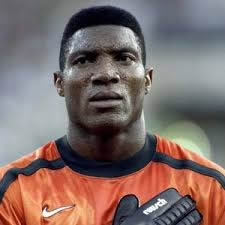A Royal Legacy Forged in Football: The Life and Times of Peter Rufai
Peter Rufai, affectionately known as “Dodo Mayana,” transcended the realm of a mere goalkeeper, evolving into a symbol of Nigerian football and an embodiment of unwavering dedication. Born on August 24, 1963, into royalty in Oshodi, Lagos, Rufai’s life story was one of choosing passion over privilege. Destined to inherit his father’s throne in Idimu, he charted a different course, drawn by the allure of the beautiful game. This decision marked the beginning of a remarkable journey that would etch his name into the annals of football history.
Rufai’s professional odyssey began on Nigerian soil, with stints at Stationery Stores and Femo Scorpions. However, his ambition propelled him beyond national borders, leading him to clubs in Benin (Dragons de l’Ouémé), Belgium (Lokeren, Beveren), the Netherlands (Go Ahead Eagles), Portugal (Farense, Gil Vicente), and Spain (Hércules, Deportivo La Coruña). This international exposure not only honed his skills but also exposed him to diverse playing styles and tactical approaches, shaping him into a well-rounded and adaptable goalkeeper. His time at SC Farense in Portugal during the 1994-95 season stands out as a testament to his prowess, where his exceptional performance, conceding only 38 goals in 34 matches, guided the club to its first-ever UEFA Cup qualification.
On the international stage, Rufai became an indispensable figure for the Nigerian Super Eagles. With 65 caps to his name, he stood as the unchallenged first-choice goalkeeper in two FIFA World Cups, 1994 and 1998. His contributions extended beyond shot-stopping; his leadership and commanding presence in the box provided a sense of security and confidence to the entire team. The pinnacle of his international career came in 1994 when he played a crucial role in Nigeria’s triumphant Africa Cup of Nations campaign in Tunisia. This victory solidified his status as a national hero and cemented his legacy within Nigerian football folklore.
Beyond the remarkable saves and commanding presence, Rufai possessed a unique skill rarely seen in goalkeepers: goal-scoring ability. In a match against Ethiopia during the 1993 AFCON qualifiers, he stepped up to take a penalty and calmly slotted the ball into the net, contributing to a resounding 6-0 victory. This rare feat added another dimension to his already impressive repertoire and became a defining moment in his career, showcasing his versatility and composure under pressure.
The moniker “Dodo Mayana” became synonymous with Rufai’s acrobatic saves and lightning-quick reflexes. His ability to seemingly defy gravity and pluck the ball from the air earned him this endearing nickname, reflecting the awe and admiration he inspired in fans. It was a testament to his athleticism, his anticipation, and his inherent ability to read the game, qualities that set him apart from his peers.
Retirement from professional football did not mark the end of Rufai’s involvement in the sport he loved. Driven by a deep-seated desire to nurture the next generation of Nigerian footballers, he embarked on a new chapter, dedicated to coaching and mentorship. In 2023, he enrolled at the National Institute for Sports in Lagos, seeking formal coaching qualifications. This commitment reflected his belief in the importance of structured training and development, essential for the growth and progress of young athletes.
Rufai’s commitment to youth development extended beyond formal coaching. He established the Staruf Football Academy in Lagos, providing a platform for aspiring footballers to hone their skills and pursue their dreams. He championed the idea of a balanced approach, advocating for the integration of academics alongside sporting pursuits. His message resonated with parents and young players alike, emphasizing the importance of education as a foundation for a well-rounded life.
Underlying Rufai’s success was an unwavering commitment to discipline, focus, and an unrelenting drive to exceed expectations. These principles served as his guiding stars throughout his 20-year career, enabling him to thrive in diverse environments and navigate the pressures of professional football. He personified dedication and resilience, qualities he sought to instill in the young players he mentored.
Despite the numerous accolades and triumphs, Rufai’s career was not without its disappointments. The 4-1 defeat against Denmark in the Round of 16 of the 1998 World Cup remained a poignant memory. He candidly acknowledged the pain of this loss, describing it as the most difficult match of his career. However, he emphasized the importance of collective responsibility, attributing the defeat to a collective failure rather than individual errors.
In conclusion, Peter Rufai’s life was a testament to the power of passion, dedication, and the pursuit of excellence. From his royal roots to his international football career, he defied expectations, choosing a path less traveled and forging a legacy that extended beyond the football pitch. His contributions to Nigerian football, both as a player and a mentor, will forever be etched in the hearts of fans and aspiring athletes. He was more than a goalkeeper; he was an icon, a leader, and an inspiration, embodying the spirit of Nigerian football and leaving an indelible mark on the sport he loved.


